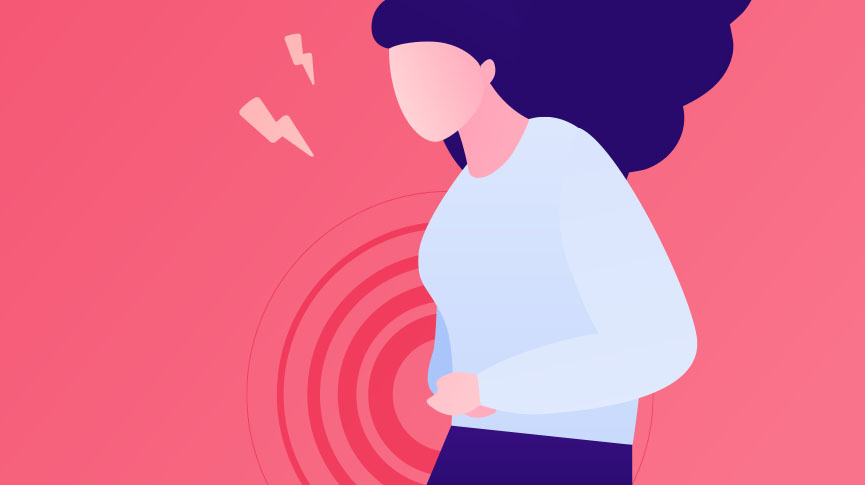Diarrhea and Your Period: What’s the Deal! And What About Constipation?

If you’re of the fairer sex, the chances of experiencing a not-so-happy tummy during your period are high. And not just because of those awful, often debilitating, period cramps and bloating! Indeed, diarrhea, or even pooping more frequently, and your period often go hand-in-hand. In fact, nearly three-quarters of women admit to having gastrointestinal issues before or during their period. Why? The short answer, hormones!
Why Do You Get Diarrhea While on Your Period?
Vulva owners experience incredible changes in hormone levels throughout their cycles. But when it comes to that time of the month, prostaglandins are busy little bees. Let’s elaborate… A few days before your period, when your uterus lining begins to shed, the hormone prostaglandin is released. This hormone tells your uterus to contract, prompting the expulsion of period blood. And when prostaglandins really get to work, they can cause a bit of tension further down, to your intestines. In other words, your stool won’t have much time to harden as it’s been told to move swiftly along, resulting in diarrhea.
Prostaglandins: The Main Culprit of Period Poops & Period Pain
Prostaglandins are a group of lipids that are made at the site of tissue damage or infection, such as injury or illness. They control processes such as inflammation, blood flow, and the induction of labor. And in the case of the female anatomy, prostaglandins trigger muscles in your uterus to contract during your period and when you’re in labor. During the first day of your period, this hormone is high, which is why you’ll usually find that the first and second day of menstruation is more painful than the others.
When Prostaglandins Lessen, Progesterone Increases
Then, just before or near the end of your period, your progesterone levels increase. Your uterus lining starts to thicken again, and this is when the uterine contractions stop. The same kind of signal is then sent to the bowels, which could result in constipation.
“[Bowel movements] can change with different hormone levels,” says Frank Marrero, MD, a gastroenterologist with the Lake Charles Memorial Health System in Louisiana. “In fact, some women may even notice the opposite and become constipated during their period.”
Is it Normal to Have Diarrhea Whilst on Your Period?
It’s completely normal. As we mentioned, it’s a common complaint among many women. But if you find that you have severe diarrhea and/or suffer from the following conditions, it may be best to visit a professional:
- Endometriosis
- Fibroids
- Ovarian cysts
- Polycystic ovary syndrome (PCOS)
- Irritable bowel syndrome (IBS)
- Severe cramps or abdominal pain (worse than usual)
- Heavy periods (heavier than usual)
- Rectal bleeding
- Blood when wiping
- Mucus in your stool
Is There Any Way to Prevent Diarrhea Period Poops?
There are a number of ways that you can reduce period-related diarrhea, or even prevent it altogether. Just be aware that everyone’s body is unique and that what might work for one may not work for another. Perhaps none of these solutions will work at all.
We do however encourage you to try some of them in hopes of easing or eradicating diarrhea during your period:
- Take the birth control pill, which can help regulate your period and reduce diarrhea. Additionally, if you skip the placebo pills and avoid a period altogether, you can eliminate the chance of having period diarrhea.
- Try to reduce stress, which can make menstrual symptoms worse. You could try meditation, taking an hour out of your day to unplug and relax, and/or exercising.
- Take ibuprofen a day or two before your period, which could reduce the effects of prostaglandins on your body.
- Use gentle OTC (over-the-counter) medicine for diarrhea, such as MiraLax.
Staying Healthy During Diarrhea on Your Period
- Make sure you’re hydrated so that you can make up for the water loss that occurs during diarrhea.
- Avoid foods that tend to make diarrhea worse, such as caffeine, artificial sweeteners, dairy products, spicy foods, and sugary foods.
- Take fiber supplements, or eat more foods with fiber before your period, such as whole-grain breads, and fruits and vegetables with the skin on them, which can add bulk to your stool.
- Add probiotic foods into your diet, like miso, sauerkraut, yogurt, or kimchi, which can boost healthy bacteria in your gut.
- Eat smaller meals more frequently so that the body can digest it easier.
- Replace electrolytes that can get lost during diarrhea, such as sports drinks or coconut water.
- Eat salty food to replace sodium that gets lost during diarrhea, which will then help the body to retain more water.
Diarrhea During Your Period: When to See a Doctor
For many, getting bouts of diarrhea just before and during a menstrual period is normal.
But if you find that it’s interfering with your normal everyday life, such as the symptoms below, it’s best to consult a professional:
- You’re experiencing diarrhea or other GI symptoms that persist longer than two days
- You have severe cramping (that’s worse than usual) in your stomach or pelvis that isn’t getting better with OTC medicine
- You have blood or mucus in your stool, which could indicate other health problems
Diarrhea and Your Period, FAQs
In case there’s a question you’re pondering on that has yet to be answered above, here are three FAQs on diarrhea and your period.
Why do period poops smell so bad?
If you find your period poops smell bad or worse than non-period poops, it could be because of your premenstrual eating habits. There’s often a decrease in impulse control during pre-menstruation, which means that you may be prone to eating different foods than normal.
Can I prevent my tampon from coming out during a bowel movement?
Some people may push out their tampons whilst making a bowel movement because of the strain. You could opt for a different menstrual product, like a menstrual cup, which is more likely to stay put.
Do I have to change my tampon after every poop?
This is entirely up to you. If you get poop on your tampon string, it is advised to change your tampon because feces contain harmful bacteria, which could lead to vaginal infections. To prevent getting poop on your tampon string, you could hold it to the front or side or tuck it into your labia. Alternatively, consider other menstrual products.
The Opposite End of the Spectrum: Constipation
And finally, before your period, or after it ends, you may think you’re in the clear when it comes to digestive issues. Then, you experience constipation! What’s that all about? Well, as we mentioned, when your menstrual period ends, there’s an increase in progesterone. This causes food to move more slowly through your intestines, causing you to feel backed up.
This too is normal, but there are some things you can do to help relieve constipation:
- Drink more water which can soften the stool, making it easier to pass
- Focus on natural fiber sources, like apples, broccoli, oats, beans, and pears
- Exercise to stimulate sluggish intestines
- Always go to the bathroom when you think you need to go as not to disrupt the mind-body connection
- Talk to your doctor about laxatives if your constipation is severe
Some may argue that going through menstruation is a curse. And sure, symptoms such as diarrhea, constipation, bloating, and cramps aren’t, in any shape or form, a joy. But menstruation is powerful, and a way to connect to your most feminine and divine power. You, menstruating individuals, are sheer magic.

Helena is a sex-positive South African writer who loves swimming in the ocean under the full moon and cheesy 90’s pop. She’s currently living her best life in Porto, Portugal after scouring different continents to find her happy place.



Lovelovelove
Miralax is for constipation, not diarrhea.